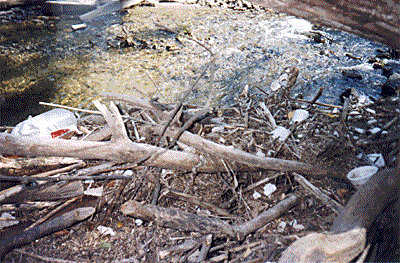All Nonfiction
- Bullying
- Books
- Academic
- Author Interviews
- Celebrity interviews
- College Articles
- College Essays
- Educator of the Year
- Heroes
- Interviews
- Memoir
- Personal Experience
- Sports
- Travel & Culture
All Opinions
- Bullying
- Current Events / Politics
- Discrimination
- Drugs / Alcohol / Smoking
- Entertainment / Celebrities
- Environment
- Love / Relationships
- Movies / Music / TV
- Pop Culture / Trends
- School / College
- Social Issues / Civics
- Spirituality / Religion
- Sports / Hobbies
All Hot Topics
- Bullying
- Community Service
- Environment
- Health
- Letters to the Editor
- Pride & Prejudice
- What Matters
- Back
Summer Guide
- Program Links
- Program Reviews
- Back
College Guide
- College Links
- College Reviews
- College Essays
- College Articles
- Back
Do Your Part: Daily Solutions to Earth's Pollutions
Take a look outside. Peer from your window through the dirty glass and peeling painted pine panels. What do you see? Do you see just trees and green? Do you see animals? Or do you see a world that is yet to be explored? Do you see the endless leaves and grasses and the tiny insects and the flawless blue sky? Do you want to reach your heart out to preserve that perfect picture? I do.
Nature is the real world. The environment is the world that truly matters. Not social media and Internet, no, that doesn’t matter. At the end of the day, if Earth is not well, we are not well. What should come first is taking care of our home, our real home: the trees, the ozone, the animals, the oceans, and our backyards. All these things are the things that matter in this life. Wouldn’t you do everything in your power to protect our Earth if you could? So why don’t you?
Every single time I am driving down the road, I see trash. There is trash in the woods, on the side of the road, and in sand dunes. It is mind-boggling to me how people can just toss plastic and Styrofoam out the window and into the trees. Once the trash is there, chemicals leach into the ground, or animals eat it and then become sick. Plastic bags take a minimum of five hundred years to decompose and become part of the Earth. Styrofoam cups take five hundred to forever years to break down. Glass takes one million years. People don’t comprehend the severity of their actions. One toss of a Styrofoam cup out of the window, and that cup will be there forever. It will never decompose. As it sits there leaching chemicals slowly into the ground while you have a family, and your family has a family, and life continues for thousands of years, that cup will still be there.
Laziness is a large component of the trash and pollution we see every day. If everyone in the world recycled, the results would be life-changing. Our carbon footprint would be significantly reduced. Trash in oceans would be reduced, and the size of the great pacific garbage patch would decrease. There are always alternatives to plastic and Styrofoam. If you are going to get a coffee or drink somewhere, bring a metal thermos or a refillable metal water bottle. That way you completely bypass the Styrofoam and plastic cups. At the grocery store, opt to bring in your own canvas bags instead of using the paper or plastic bags the store offers. Many grocery stores are now starting to charge for plastic bags as well, so the money you spend on reusable bags will be compensated with the money you save by not buying plastic bags.
It is not only plastic and Styrofoam that have major impacts on the environment, but metal as well. In the ten years between 1990 and 2000, Americans alone wasted 7.1 million tons. That is enough metal to reproduce the planet's entire commercial air fleet twenty-five times, or enough to manufacture three hundred and sixteen thousand Boeing 737s. Metal is comprised of many ores that are harvested below the surface of the earth; this process is extremely harmful to the environment. It uses massive amounts of energy and water, and increases greenhouse gases by burning fossil fuels. By recycling aluminum cans, 95% less energy is used when processing them compared to raw materials. When you recycle aluminum cans, you are reducing air, soil, and water pollution, reducing landfill space and the need for mining, and supporting new job opportunities.
Earth needs your help now more than ever. Half of the planet’s tropical and temperate forests have vanished. Three-quarters of all fish are overfished or fished to capacity. Over 2 million people die prematurely worldwide every year from air pollution. In just the past 50 years alone, humans have used more resources than in all of history. Please, do your part. Earth gave you life; help sustain it.
Group, Hertfordshire Recycling. "Facts About Metals." - Recycling Consortium. Recycling Consortium, n.d. Web. 13 Jan. 2016.
"Environmental Facts." Ecocycle.org Mobile. Eco-Cycle, n.d. Web. 13 Jan. 2016.

Similar Articles
JOIN THE DISCUSSION
This article has 0 comments.
